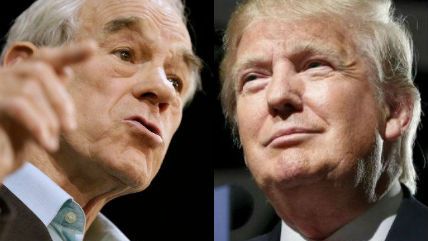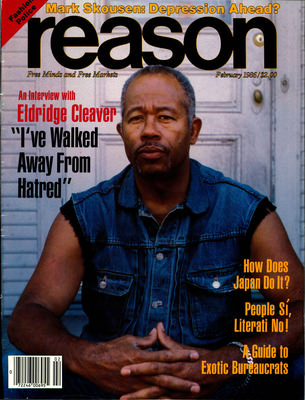Washington Post Contributor Falsely Accuses Reason of 'Repeatedly Editorializ[ing]' in Favor of Apartheid (UPDATED)
This kind of Transitive Property sloppiness is what happens when you try to pin Donald Trump on libertarians


Matthew Sheffield, editor of the metapolitical journal Praxis, has taken to the Washington Post to point out some of the connections and similarities between the Donald Trump movement and the late-1980s "paleolibertarian" strategy of Murray Rothbard and Lew Rockwell and others, which found expression in (among other places) foul newsletters from a quarter century ago produced under the name of Ron Paul.
The paleo/Trump overlap is an interesting potential ground for examination, and has been looked at this cycle (usually stressing Buchananite paleoconservatism) by the likes of Michael Brendan Dougherty and Jim Geraghty. But in making the highly reductive leap that "Trump and Paul speak the same language," Sheffield demonstrates that he's more interested in dot-connecting than a genuine understanding of different ideological and tactical strains. This comes through loud and clear in a false aside about Reason:
There had always been some sympathy for racism and anti-Semitism among libertarians—the movement's house magazine, Reason, dedicated an entire issue in 1976 to Holocaust revisionism and repeatedly editorialized in defense of South Africa's then-segregationist government (though by 2016, the magazine was running articles like "Donald Trump Enables Racism").
There have been many journalists who have learned the hard way not to trust information from Mark Ames, the source behind the Reason material above. To put it plainly, Reason never editorialized in defense of South Africa's then-segregationist government. Sheffield's claim is false, and I look forward to the Washington Post's correction. UPDATE: The Post has indeed run a correction, which was quite inadequate and deserving of further correction.
As I wrote when the charge first came up, in a piece that links to and describes the entire relevant archive,
If defending apartheid was a "matter of faith" in Reason during the '70s and '80s [as Ames claimed], you would expect editors and staffers and contributors to routinely make that case when the subject of apartheid came up. Instead, from the editor in chief to the writer of Brickbats to book reviewers to the anti-apartheid activists themselves, the South African policy of forcible racial discrimination was described as "bigoted," "repressive," "thoroughly racist," an "absurd anachronism," "an anathema," "bad for business," and worse. Essayists wrote treatises on "how to dismantle apartheid"; feature writers celebrated developments they hoped "ultimately destroys…apartheid," Editor Robert Poole asked Zulu leader Gatsha Buthelezi questions like "What's the best thing the United States government could do to help end apartheid?", and on and on.
The entire case for Reason's allegedly institutional pro-apartheid bias rests on three pieces written not by an employee of the magazine, but by a single South African freelancer, Marc Swanepoel. As I indicated in my post, I disagree strenuously with what Swanepoel wrote back when I was in elementary school. But even he described the apartheid regime as a "dictatorship," and called for the abolition of "omnipotent government, whether in black or in white hands." To repeat: Reason never editorialized, let alone "repeatedly," in defense of the apartheid regime. Sheffield and the Washington Post need to correct the record.

Nor is it true that Reason "dedicated an entire issue in 1976 to Holocaust revisionism," as Sheffield parrots from another misfired Ames attack. That February 1976 issue, as Nick Gillespie pointed out at the time, was surely not the magazine's finest hour, but the theme was revisionism-revisionism (i.e., challenging popular storylines Americans tell themselves about the country's pristine motives for going to war), rather than questioning the veracity of the Holocaust. "That scurrilous topic is not the focus of any of the articles in the issue," Gillespie wrote; instead the pieces were about things like what Franklin Roosevelt knew in advance about Pearl Harbor, and whether any actors other than Germany played a role in starting World War II.
It is true that, in Gillespie's words, "the inclusion of contributors such as James J. Martin, who would go on to join the editorial board of the contemptible denialist outfit the Institute of Historical Review, is embarrassing," as is the presence of Gary North (who would "later be excoriated in this 1998 Reason article for arguing in favor of violent theocracy and the stoning of gays and others"). But it is not true that that was an "entire issue" dedicated to "Holocaust revisionism." Sheffield and the Post should correct.
I'll mostly leave comment on the rest of piece—which was headlined "Where did Donald Trump get his racialized rhetoric? From libertarians"—to others. Aside from saying that I'm the opposite of a paleolibertarian fan (my first editor's note for Reason was titled "Ron Paul's Mistake"), I just cannot wrap my head around the present-tense assertion that Paul and Donald Trump "speak the same language." Unless the GOP nominee has been slipping in a few malinvestments here and there, or Paul has suddenly developed a fondness for taking other countries' oil.


Show Comments (196)